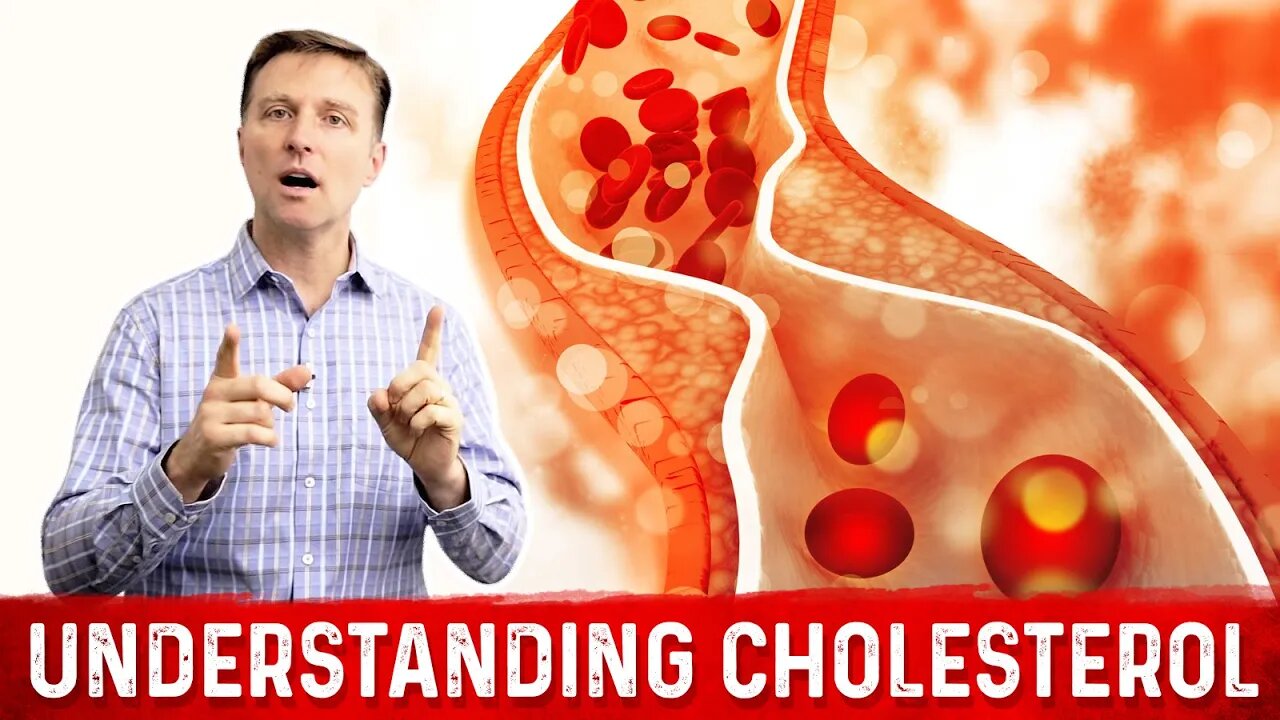Premium Only Content

How to Read and Understand Your Cholesterol Levels
What do your cholesterol levels mean? Watch this video to find out!
Timestamps
0:00 Introduction: Understanding your cholesterol levels
0:10 The function of cholesterol
1:00 Good vs. bad cholesterol
2:44 What is behind high cholesterol?
4:18 What are triglycerides?
5:44 How to improve your cholesterol levels
7:42 Key takeaways
In this video, we’re going to talk about how to read and understand your cholesterol levels.
What is the function of cholesterol? Cholesterol acts as a cell membrane coating. Every cell in the body has a coating of cholesterol.
Cholesterol is essential for the creation of hormones in the body—especially stress hormones and sex hormones.
Cholesterol also plays an important role in brain function and memory. This is why one potential side effect of statin medications (which lower your cholesterol) is memory loss.
More uses of cholesterol include the creation of vitamin D and bile.
What is the difference between “good” and “bad” cholesterol?
HDL is considered good cholesterol, and LDL is considered bad cholesterol.
HDL stands for high-density lipoprotein, and LDL stands for low-density lipoprotein.
There’s no such thing as good and bad cholesterol. There’s only one type of cholesterol. The only difference between HDL and LDL is the protein that encapsulates it.
To mix cholesterol with water, you have to encapsulate it with protein.
LDL transports cholesterol from the liver to the bloodstream. HDL takes the excess cholesterol that LDL transports and removes it from the bloodstream to put back into the liver.
HDL should be greater than 40 in men and greater than 46 in women. LDL should be less than 130.
What are triglycerides? Triglycerides are fats in your blood—they are sugars converted into fat. They are used to transport excess carbohydrates. So if you have high triglycerides, it’s likely that you have way too much sugar in your body.
Insulin converts sugar into triglycerides. You want your triglycerides to be less than 150.
The triglyceride to HDL ratio is a much better indicator of your heart disease risk.
The best way to improve your ratio is to lower your carbohydrate/sugar intake. Healthy Keto is the best diet for lowering your carbohydrates.
75% of the cholesterol in your body is created by your body. Only 25% of the cholesterol in your body is dietary.
http://ajcn.nutrition.org/content/82/...
http://www.forbes.com/sites/edsilverm...
http://www.cbsnews.com/news/new-chole...
Best Indicator for Coronary Heart Disease: Triglyceride/HDL Ratio:
https://www.ncbi.nlm.nih.gov/pmc/arti...
Talk to a Product Advisor to find the best product for you!
Call 1-540-299-1556 with your questions about Dr. Berg's products. Product Advisors are available Monday through Friday 8am-6pm and Saturday 9am-5pm EST.
* At this time, we no longer offer Keto Consulting and our Product Advisors will only be advising on which product is best for you and advise on how to take them.
Dr. Eric Berg DC Bio:
Dr. Berg, age 57, is a chiropractor who specializes in Healthy Ketosis & Intermittent Fasting. He is the author of the best-selling book The Healthy Keto Plan, and is the Director of Dr. Berg Nutritionals. He no longer practices, but focuses on health education through social media.
Follow Me On Social Media:
Facebook: https://bit.ly/FB-DrBerg
Instagram: https://bit.ly/IG-DrBerg
Anchor: https://bit.ly/Anchor-DrBerg
TikTok: https://bit.ly/TikTok-DrBerg
Send a Message to his team: https://m.me/DrEricBerg
ABOUT DR. BERG: https://www.drberg.com/dr-eric-berg/bio
Disclaimer:
Dr. Eric Berg received his Doctor of Chiropractic degree from Palmer College of Chiropractic in 1988. His use of “doctor” or “Dr.” in relation to himself solely refers to that degree. Dr. Berg is a licensed chiropractor in Virginia, California, and Louisiana, but he no longer practices chiropractic in any state and does not see patients so he can focus on educating people as a full time activity, yet he maintains an active license. This video is for general informational purposes only. It should not be used to self-diagnose and it is not a substitute for a medical exam, cure, treatment, diagnosis, and prescription or recommendation. It does not create a doctor-patient relationship between Dr. Berg and you. You should not make any change in your health regimen or diet before first consulting a physician and obtaining a medical exam, diagnosis, and recommendation. Always seek the advice of a physician or other qualified health provider with any questions you may have regarding a medical condition.
#keto #ketodiet #weightloss #ketosis
Thanks for watching. I hope this helped explain how to read and understand your cholesterol levels. I’ll see you in the next video.
-
 13:21
13:21
Dr. Eric Berg
12 days agoDRINK 1 CUP A DAY to Unclog Your Arteries
8.12K25 -
 8:18
8:18
The Pascal Show
12 hours ago $0.96 earnedWHOA! Trump ABSOLUTELY LOSES IT On A Reporter Asking About Epstein
5.75K8 -
 32:09
32:09
Comedy Dynamics
14 hours agoBest of Jesus Trejo: Stay at Home Son - Stand-Up Comedy
6.45K -
 55:43
55:43
TruthStream with Joe and Scott
1 day agoHoney and Lisa 11/17: How powerful we are, Trauma release, Becoming Sovereign (next healing event 11/20/25 @ noon eastern and 4pm eastern) #513
8.08K10 -
 LIVE
LIVE
Lofi Girl
3 years agolofi hip hop radio 📚 - beats to relax/study to
471 watching -
 1:00:27
1:00:27
Coin Stories with Natalie Brunell
1 day agoMike Alfred’s Full Investment Playbook: Inside Bitcoin, Miners & AI
40K2 -
 2:34:07
2:34:07
Badlands Media
15 hours agoDEFCON ZERQ Ep. 018: Global Smokescreens & the Deep State Energy War
218K73 -
 2:05:03
2:05:03
Inverted World Live
9 hours agoHouse Votes to Release Epstein Files w/ Emilie Hagen & Denise Bovee | Ep. 143
65.9K4 -
 3:02:27
3:02:27
TimcastIRL
9 hours agoEpstein Transparency PASSED UNANIMOUSLY, Trump To SIGN Release | Timcast IRL
260K130 -
 6:26:43
6:26:43
SpartakusLIVE
11 hours agoARC is SO ADDICTING - I just CAN'T stop || NEW SCHEDULE, NEED SLEEP
90.9K3